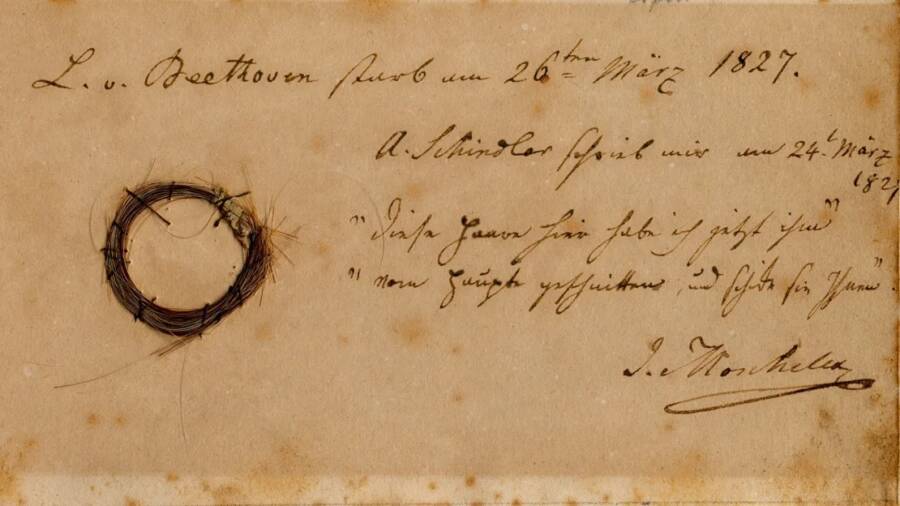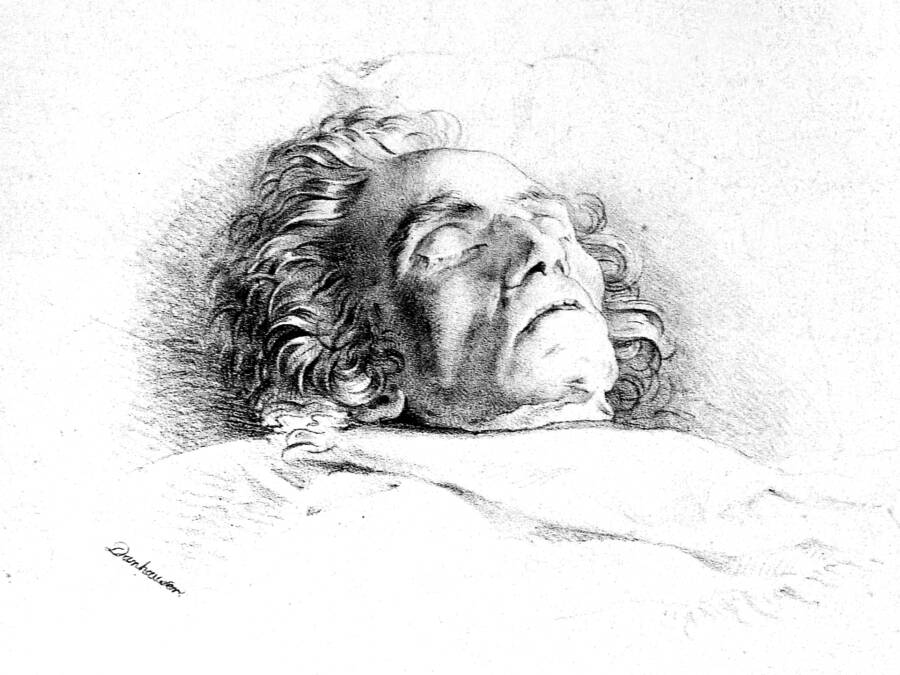Staggeringly high levels of lead were found in Ludwig van Beethoven's hair, as well as mercury and arsenic.

Ira F. Brilliant Center for Beethoven Studies/San Jose State UniversityA lock of Beethoven’s hair taken from his body around the time of his death in 1827.
Ludwig van Beethoven is widely recognized as one of the world’s most influential and pioneering classical composers. He was also deaf, making his symphonies all the more impressive. Now, nearly 200 years after Beethoven’s death, researchers believe they may have found a possible cause of his deafness: extremely high levels of lead in his system.
The German composer’s hearing loss, which began in his 20s, often comes up when his name is mentioned, but it was hardly the only health problem he suffered from. Beethoven was also prone to frequent gastrointestinal issues, including agonizing abdominal cramps, flatulence, and diarrhea.
It’s commonly thought that Beethoven died of complications from liver and kidney disease at age 56 in 1827. But his sickliness leading up to his death has remained mysterious. Some experts have speculated that Paget’s disease of bone may have led to his deafness. Others have offered irritable bowel syndrome as a possible explanation for his stomach cramps.
But is it possible that the high levels of lead in Beethoven’s system were responsible for both his deafness and his gastrointestinal problems? That’s what experts now believe following a new analysis of the composer’s hair.
How The Lead Found In Beethoven’s Hair May Explain Why He Went Deaf
In a new study published in the journal Clinical Chemistry, researchers analyzed authenticated samples of Beethoven’s hair and discovered that it contained high levels of lead. For comparison, a normal lock of hair has less than four micrograms of lead per gram of hair, and one of Beethoven’s locks had a whopping 380 micrograms of lead per gram of hair.
If these findings sound somewhat familiar, it’s because, in a way, they are. Back in 2007, Christian Reiter, then a deputy director of the Center of Forensic Medicine at the Medical University of Vienna, published a study in which he had analyzed a purported lock of Beethoven’s hair called the Hiller Lock. However, a 2023 study later revealed that the Hiller Lock had not, in fact, belonged to Beethoven. It actually belonged to a woman.
Despite analyzing the wrong person’s hair, Reiter did find surprisingly high amounts of lead present in the Hiller Lock, leading him to the same conclusion that lead may have contributed to Beethoven’s deafness and some of his other chronic health problems.

Public DomainAn illustration of Beethoven on his deathbed.
Since then, other locks of hair — including the Bermann Lock and the Halm-Thayer Lock — have been authenticated and definitively linked back to Ludwig van Beethoven. At the time of the 2023 study disproving the Hiller Lock, the others had not yet been fully analyzed for lead.
“Using the Centers for Disease Control and Prevention proposed conversion formula of values from hair lead concentration to blood lead concentration, the estimate of Beethoven’s blood lead concentration would have been 69 to 71 µg/dL,” study authors wrote. “Such lead levels are commonly associated with gastrointestinal and renal ailments and decreased hearing but are not considered high enough to be the sole cause of death.”
But how did Beethoven end up with so much lead in his system? As the study notes, he was not known to have used hair dyes, which would have been a much clearer indicator of lead poisoning. Rather, the authors noted, his love of wine may have been partially to blame for his condition.
Beethoven was known to enjoy wine and drank about a bottle a day (sometimes even more). During Beethoven’s time, lead was often used in the wine production process, and many wine glasses were also made with lead.
In addition, lead was used in many medications at the time. So it’s possible that one of the treatments that Beethoven used in the hopes of alleviating his painful symptoms made his overall health even worse.
Other Factors That May Have Contributed To Beethoven’s Poor Health
Lead was not the only substance that researchers found in Beethoven’s hair. The locks also contained alarmingly high levels of mercury and arsenic. Given that Beethoven was also a big fish eater, it’s likely that the fish he ate — which was sourced from the Danube River, where waste was often deposited — contributed to the increased levels of mercury and arsenic.
Beethoven also had genes that predisposed him toward liver disease, a hepatitis B infection, and he frequently consumed alcohol, all of which would have likely contributed to his poor health leading up to his demise.

Public DomainAfter leaving an unforgettable mark on music history, Ludwig van Beethoven died on March 27, 1827.
The study authors clarified that they do not believe the lead in Beethoven’s system was the sole cause of his death, but they now believe it was likely a contributing factor to the overall decline in his health over the years — particularly, his hearing loss and his gastrointestinal problems.
“Furthermore, low hair lead concentration may be a poor predictor of blood lead values and the potential associated ailments,” they wrote. “However, higher hair lead concentrations, such as those seen in this study, have been shown to correlate with kidney and liver disease.”
They concluded by saying they believe their findings are “an important piece of a complex puzzle and will enable historians, physicians, and scientists to better understand the medical history of the great composer.”
After reading about the analysis of Beethoven’s hair, go inside the enduring mystery of Wolfgang Amadeus Mozart’s death. Then, dig into the theory that Beethoven may have been Black.





